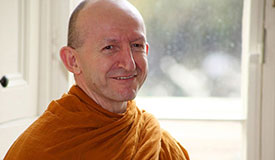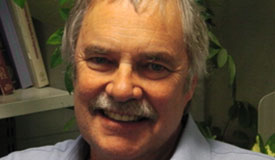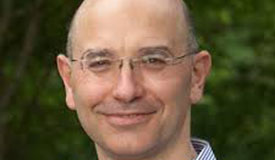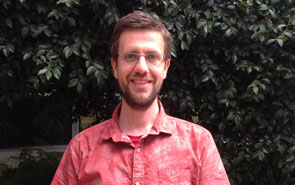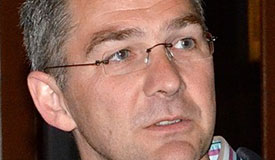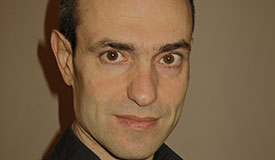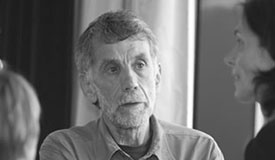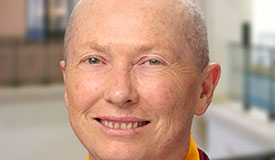Board Of Directors
Salvatore M. Aglioti, Ph.D., is Full Professor at Sapienza University of Rome, where he leads the Social and Cognitive Neuroscience Laboratory (agliotilab.org). Trained as clinical neurologist, he developed a specific research interest in the neural representation of corporeal awareness in healthy and brain damaged humans, with focus on the link between bodily representations and transcendence-related personality traits. He conducted reserach on the neural correlates of pain perception and empathy for pain in neurotypicals and people with non-standard social interaction abilities (e.g. in individuals with Asperger Syndrome). SMA has recently opened a new research concerning the new field of existential neuroscience. He is scientific consultant at the Fondazione Santa Lucia IRCCS, a high-specialy research hospital in Rome. He has supervised 50 PhD students, most of whom are now assistant or associated professors in Italian or foreign Universities or research centers. In 2013 he received the Senior Investigator Award for his TMS studies concerning body and action. He has coodinated many research projects funded by Italian and international agencies (e.g. the IIT project on action anticipation). He participated as responsible of the Rome research unit to EU 7th Framework Integrated Projects (e.g., VERE, www.vereproject.org; TANGO, http://spitswww.uvt.nl/tango). Amaro Bhikkhu, Abbot, born in England in 1956, received his BSc. in Psychology and Physiology from the University of London. Spiritual searching led him to Thailand, where he went to Wat Pah Nanachat, a Forest Tradition monastery established for Western disciples of Thai meditation master Ajahn Chah, who ordained him as a bhikkhu in 1979. He returned to England and joined Ajahn Sumedho at the newly established Chithurst Monastery. He resided for many years at Amaravati Buddhist Monastery, making trips to California every year during the 1990s. In June of 1996 he established Abhayagiri Monastery in Redwood Valley, California, where he was co-abbot with Ajahn Pasanno until July, 2010. Ajahn Amaro has written a number of books, including an account of his 830-mile trek from Chithurst to Harnham Vihara called Tudong - the Long Road North, republished in the expanded book Silent Rain. Other works published by him include Small Boat, Great Mountain (2003), Rain on the Nile (2009) and The Island - An Anthology of the Buddha's Teachings on Nibbana (2009) co-written with Ajahn Pasanno. Ajahn Amaro returned to Amaravati in July, 2010. At that time, he then moved back to Amaravati Buddhist Monastery in England to take up the position of abbot of this large monastic community. Henk P. Barendregt, Ph.D., Professor of Foundations of Mathematics and Computer Science at Radboud University, Nijmegen, The Netherlands. He received his Ph.D. cum laude for a thesis in Mathematical Logic in 1971 at Utrecht University. His best known works in logic are "The Lambda Calculus, Its Syntax and Semantics" (translated into Russian and Chinese), 1981, Elsevier, and "Lambda Calculus with Types", 2013, Cambridge University Press. From 1972 to 1979, Barendregt studied Zen meditation with Kobun Chino Roshi in California, and from 1977 to 2006 Vipassana meditation with Most Venerable Phra Mettavihari. Prof. Barendregt teaches Vipassana since 2001. In 2006 he was qualified by Phra Mettavihari to direct Vipassana retreats in the style of Mahasi Sayadaw. Barendregt has received substantial personal research funds from Nijmegen University (1997) and the Spinoza award in 2002 from the Dutch National Science Foundation (NWO). Given funds enabled him to direct an interdisciplinary research group towards understanding insight meditation and its effects in neuropsychological terms. Barendregt, Knight in the Order of the Nederlandse Leeuw (Dutch Lion), holds memberships of the Academia Europaea, the Koninklijke Hollandsche Maatschappij der Wetenschappen, and the Royal Dutch Academy of Sciences. Axel Cleeremans, Ph.D., is a Research Director with the National Fund for Scientific Research (Belgium) and a professor of cognitive science with the Department of Psychology of the Université Libre de Bruxelles. Cleeremans completed his Ph.D. at Carnegie Mellon University under the supervision of James McClelland. Currently he is Research Director of the “Consciousness, Cognition & Computation Group” at the Université Libre de Bruxelles, funded by the National Fund for Scientific Research. His work, broadly situated within the area of consciousness research, has focused on the nature of the processes underlying incidental (or implicit, or unconscious) learning. Cleeremans has been member of the board of the Association for the Scientific Study of Consciousness, and in 2000 organized its fourth annual meeting held at the Université Libre de Bruxelles. He acted as editor of a book based on the meeting (The Unity Of Consciousness: Binding, Integration, and Dissociation, Oxford University Press, 2003). He is past-president of the Belgian Association for Psychological Sciences. Cleeremans is also past-president of the European Society for Cognitive Psychology, and associate editor for Consciousness and Cognition. He was elected Member of The Royal Academy of Belgium. In 2009 he was one of the editors of The Oxford Companion to Consciousness (Oxford University Press), an extensive overview of the field of consciousness research. Today, he acts as Secretary-General for the National Committee of Psychological Science (Belgium). He is also Field Editor-in-Chief of the open access series of journals Frontiers in Psychology, a function in which he oversees about 1200 editors. Eijun Linda Cutts, Roshi, Abbess, came to San Francisco Zen Center in 1971 and was ordained as a priest in 1975. She has lived at Tassajara and San Francisco City Center, and has resided at Green Gulch Farm since 1993. In 1996 Linda received Dharma transmission from Tenshin Reb Anderson and served as Abbess of San Francisco Zen Center from 2000 to 2007. She was appointed Abiding Abbess of Green Gulch Farm Zen Center in 2010, and in 2014 she became the Central-Abbess of San Francisco Zen Center. She continues to teach and lead practice periods and retreats at Tassajara, Green Gulch, Mexico, Italy and elsewhere. Linda sits on the Steering Committee of the California Interfaith Power and Light (CIPL), an interfaith group dedicated to addressing climate change through faith based education and skillful action. Linda has been leading Yoga-Zen retreats and workshops for many years. Paul Gilbert, Ph.D., OBE, is Head of the Mental Health Research Unit, and Professor of Clinical Psychology at the University of Derby, where he developed Compassionate Mind Training (CMT) and Compassion Focused Therapy (CFT). He has a BA in Economics (1973), a Diploma in Clinical Psychology (from the BPS), and an MA in Experimental Psychology (1975), and a PhD in Clinical Psychology (Edinburgh, 1980). He was made a fellow of the British Psychological Society for contributions to psychological knowledge in 1993, and was president of the British Association for Cognitive and Behavioural Psychotherapy in 2003. He served on the government depression NICE guideline committee. Gilbert has published and edited 21 books, including the best selling Overcoming Depression, and The Compassionate Mind. He is the series editor for the 'compassionate approaches to life difficulties' series, published by Constable Robinson. He received an Order of the British Empire (OBE) Award in 2011 for his contributions to mental healthcare. Fabio M. Giommi, Ph.D., Clinical Psychologist, Psychotherapist. As Senior Researcher at Radboud University in the Netherlands, since 1998 with Henk Barendregt he has contributed to the foundation and developement of the MBM-Mind-Brain-Mindfulness research group. He has studied clinical and neuropsychological aspects of mindfulness. Fabio teaches Mindfulness-based Stress Reduction and Mindfulness-based Cognitive Therapy, while in Italy he co-designed and teaches an Italian Foundational Mindfulness Professional Training for MBIs instructors. Since 2009 Fabio directs the School of Specialization in Cognitive-constructivist Psychotherapy in Milan,Italy, a 4-years post-degree training - authorized and supervised by MIUR the University and Research State Ministry - to become a licensed psychotherapist. Fabio began to meditate in 1997 in the Vipassana tradition, attending retreats led by Corrado Pensa and monastic teachers from Thai and Burmese traditions. In 1998 he became deeply involved also in the Advaita Vedanta (non-dual) tradition. Since 2008 he has studied Insight Dialogue with Gregory Kramer, he is an Insight Dialogue Teacher, co-teaches retreats and is a faculty member of Metta Foundation’s Relational Insight Meditation program. Dario Doshin Girolami, M.Phil., is a Soto-Zen priest and a Dharma Teacher in the lineage of Shunryu Suzuki Roshi. He founded the Centro Zen L’Arco of Rome - Italy, where he teaches regularly. He received Dharma Transmission from Eijun Roshi-Linda Cutts, Central Abbess of San Francisco Zen Center. He started to practice in 1986 and was ordained as a Zen monk by Zenkei Roshi - Blanche Hartman. Doshin attended Zenshinji-Tassajara, Hosshinji-City Center and Soryuji-Green Gulch monasteries in the process of becoming a Zen monk and teacher, and studied under the guidance of Zen masters including Thich Nhat Hanh and Maezumi Roshi.
He also received the Avalokiteshvara initiation from His Holiness the Dalai Lama. Prior to entering the Zen path he received a Laurea degree in Indian and Eastern Religions and Philosophies under the instruction of Professor Corrado Pensa at Sapienza University of Rome. Former Adjunct Professor of “Zen” at John Cabot University and of “Comparative Religion” at the American University of Rome, he currently holds regular seminars at the Faculty of Psychology at Sapienza University of Rome, and teaches Meditation at Rebibbia Prison - Rome. Britta K. Hölzel, Ph.D., holds a PhD in Psychology and currently works as a Research Fellow at the Institute for Medical Psychology at the Charite University Hospital in Berlin, Germany. She was previously a Research Fellow at the Psychiatry Department at Massachusetts General Hospital (MGH), Harvard Medical School, and at the Bender Institute of Neuroimaging at Giessen University in Germany, and conducted functional and anatomical MRI studies to investigate the neural mechanisms of mindfulness meditation. She is the PI on two longitudinal studies investigating the effects of MBSR on healthy participants' emotion regulation. Dr. Hölzel has practiced meditation and yoga for over fifteen years, giving her an inside perspective on the phenomena she studies. She is also an MBSR instructor and teaches classes to healthy and patient populations. Chris Krägeloh is an Associate Professor in Psychology at Auckland University of Technology, New Zealand. His current research interests are psychometrics, quality of life research, and mindfulness. Chris is an Associate Editor for the journal Mindfulness. He is an author on over 80 articles in international journals, co-author of a popular research methods textbook, and co-editor of two books on student wellbeing. His latest current book projects include a mindfulness research book and an edited book on measurement in mindfulness. Gregory Kramer, Ph.D., is the Founder and Guiding Teacher of Metta Programs and has been a meditation teacher in the Western Theravadan tradition since 1980. He developed the relational vipassana practice of Insight Dialogue and has been teaching it since 1995, offering retreats in North America, Asia, Europe, and Australia. He has studied with esteemed teachers, including Anagarika Dhammadina, Ven. Balangoda Ananda Maitreya Mahanayaka Thero, Achan Sobin Namto, and Ven. Punnaji Maha Thero. He played a seminal role in auditory display research and holds several patents in digital signal processing and data sonification. His publications include Insight Dialogue: The Interpersonal Path to Freedom (Shambhala); Seedingthe Heart: Practicing Loving kindness with Children; Meditating Together, Speaking from Silence: the Practice of Insight Dialogue; and Dharma Contemplation: Meditating Together with Wisdom Texts. Jean L. Kristeller, Ph.D., is Professor of Psychology and the Director of the Center for the Study of Health, Religion, and Spirituality at Indiana State University. She received her doctorate in clinical and health psychology from Yale University in 1983. Dr. Kristeller is interested in the effects of psychological variables on physical health and illness, which has informed much of her research. It has included work with compulsive eating and obesity, smoking, the role of the physician in facilitating health behavior change, spirituality and health, anxiety disorders and the use of meditation as a way to promote self-regulatory processes. Her interest in the mind-body interface and integrative medicine arose initially from two years of studying and working in Japan, where traditional models are less inclined to separate the psychological from the physical processes than were Western models. She has conducted research on the psychology of meditation for over 25 years, including investigations on the effects of meditation on heart rate control, general well-being, spirituality, psoriasis and anxiety disorders. Her previous and currently funded NIH research is investigating the value of Mindfulness-Based Eating Awareness Training (MB-EAT) on compulsive overeating and obesity. She is a founding member and President of The Center for Mindful Eating (www.tcme.org), a virtual organization bringing resources about mindful eating to professionals in related fields. Her other (but related) line of research is investigating the role of spirituality in adjustment to serious medical illness. Current work is investigating how religious and spiritual resources, from the patient’s perspective, may help in adjusting to cancer. Peter Malinowski, Ph.D., is Senior Lecturer in Psychology at the Research Centre for Brain and Behaviour at Liverpool John Moores University and founding director of their Meditation and Mindfulness Research Group. He received his PhD in Psychology at the University of Konstanz (Germany) in 2001. Drawing from his extensive expertise in cognitive neuroscience his primary research is concerned with the psychological and neurophysiological mechanisms underpinning the positive changes resulting from meditation and mindfulness practices. His approach is underpinned by more than 25 years of meditation practice within the Karma Kagyu Tradition of Tibetan Buddhism, learning from some of the most highly regarded Buddhist teachers such as H.H. the 17th Karmapa Trinley Thaye Dorje, Kunzig Shamar Rinpoche, Sherab Gyaltsen Rinpoche and Lama Ole Nydahl and more than 20 years as Diamond Way Buddhist Teacher. In a substantial research project his group explores the neuroprotective effects of mindfulness practice, in particular following the question whether integrating such practice into daily life can positively influence cognitive effects of ageing. Several further international and national collaborations are concerned with other aspects, such as the potential of mindfulness practice to improve health-related behaviours including eating and physical activity. In his research blog, Peter regularly comments on the latest developments in meditation research: www.meditation-research.org.uk Mitsuhiro Okada, Ph.D., is Full Professor at the Department of Philosophy, and Director of the Global Research Center for Logic and Sensibility, at Keio University, in Tokyo. Former student of the University of Tokyo and Keio University's Philosophy Departments, Assistant Professor and then Adjunct Associate and full-time Professor at Concordia University (Montreal), Invited Professor at Université Paris-XI, Invited Research Director at the Centre National de la Recherche Scientifique (CNRS - France), Invited Professor at the Department of Philosophy of Paris-I Panthéon Sorbonne Université, among others. He is currently working on interdisciplinary studies on logic and philosophy. His current research interests include intuitionistic logic, phenomenological logic, inference studies with cognitive scientific and neuroscientific methodologies, logic in computer science and artificial intelligence. Prof. Okada also works on intuition in philosophy of mathematics (categorical intuition, finitist intuition, intuitionism), model-based neuro-decision making, and on other consciousness-related studies. Giuseppe Pagnoni, Ph.D., is currently a Researcher in the Department of Neural, Biomedical and Metabolic Sciences at the University of Modena and Reggio Emilia, Italy. After a Master in Physics, he completed a Ph.D. in Neuroscience and has worked for several years in the Department of Psychiatry and Behavioral Sciences, at Emory University, Atlanta (GA), where he was involved in neuroimaging research on topics such as reward processing, the role of basal ganglia in decision processes, the interaction of immune and brain function, social cognition, and intrinsic brain activity. With a personal interest in contemplative practices, he has conducted research on the neural and behavioral correlates of Zen meditation and is currently interested in the processes underlying mental effort, will and prospection. W.A. (Bill) Phillips, Ph.D., is Emeritus Professor of Neuropsychology at the University of Stirling, Scotland, UK. He began undergraduate studies in Physics at the University of Manchester. but soon switched to psychology. His PhD from the Australian National University showed that knowledge makes perception more accurate, which directly contrasts with the view that it makes perception more subjective. Five decades later Prof. Phillips still thinks that perception is an inference based on evidence, and that understanding inferential strategies is central to understanding brain, mind, and epistemology. He has worked on perception (including non-conscious processes), memory, language, and visual cognition using psychophysical, developmental, neuropsychological, neuropsychiatric, and neurocomputational methods. His focus has long been on the functions, mechanisms, and malfunctions of the processes of context-sensitive gain-control that coordinate the many specialized capabilities upon which mental life depends. He was introduced by Henk Barendregt to mindfulness about a decade ago, and has gradually become more and more convinced that it has a strong resonance with many crucial aspects of the cognitive and neurosciences. Prof. Phillips is confident that interactions between those sciences and meditative practices will make major contributions to human understanding and well-being. Ron Purser, Ph.D., is a Professor of management at San Francisco State University where he has taught the last sixteen years in both the MBA and undergraduate business programs. Prior to moving to San Francisco, he taught at Loyola University of Chicago. He received his doctorate in organizational behavior at Case Western Reserve University.
His professional writings and publications currently focus on the application of Buddhist psychology and mindfulness practices to management, and organizations. His recent articles include Revisiting Mindfulness: A Buddhist-Based Conceptualization (with J. Milillo at Harvard); Zen and the Art of Organizational Maintenance; Zen and the Creative Management of Dilemmas (with A. Low); Deconstructing Lack: A Buddhist Perspective on Egocentric Organizations; and A Buddhist-Lacanian Perspective on Lack. More recently, Prof. Purser writings have been exploring the challenges and issues of introducing mindfulness into secular contexts, particularly with regards to its encounter with modernity, Western consumer capitalism, and individualism. In 1981, he began attending classes and retreats at the Tibetan Nyingma Institute in Berkeley. His formal Zen training started at the Cleveland Zen Center in 1985 under Koshin Ogui Sensei, who had been Shunryu Suzuki’s personal assistant in the early 1960’s. After returning to San Francisco in 1997, he continued to study and practice with Zen teachers and Tibetan lamas, is now an ordained Dharma instructor in the Korean Zen Buddhist Taego order. He is co-author five books including, 24/7: Time and Temporality in the Network Society (Stanford University Press, 2007), and over 60 academic journal articles and book chapters. Antonino Raffone, Ph.D., completed a Ph.D. in Psychology at the Sapienza University of Rome, and the European Diploma in Cognitive and Brain Sciences. He holds a position of Associate Professor at the Department of Psychology of the Sapienza University of Rome. Both research and teaching of Dr. Raffone are mainly focused on consciousness, attention and mindfulness, and their neural correlates, with different methods of investigation. Dr. Raffone has been author of several international research articles on these topics and related aspects, including publications in the “Journal of Cognitive Neuroscience”, “Psychological Review”, and “Consciousness and Cognition”. In particular, he has edited a theme issue of “Philosophical Transactions of the Royal Society B” on perceptual awareness. He is active in promoting practice of mindfulness and meditation in several contexts, including prisons, and related research. He has organized several national and international events about mindfulness, and directs the Master in “Mindfulness: Practice, Clinical Applications and Neuroscience” at the Sapienza University of Rome. Dr. Raffone started to study and practice Buddhism and meditation in 2004 with Prof. Peter Harvey, and then became a dedicated Soto Zen Buddhist practitioner (with Ven. Dario Doshin Girolami), tradition in which he received a lay ordination in 2009. He also assists Henk Barendregt in Vipassana meditation retreats. Nirbhay N. Singh, Ph.D., BCBA-D, is Clinical Professor of Psychiatry and Health Behavior at the Medical College of Georgia, Georgia Regents University, Augusta, Georgia, USA. Prior to his current appointment, he was a Professor of Psychiatry, Pediatrics and Psychology at the Virginia Commonwealth University School of Medicine and Director of the Commonwealth Institute for Family Studies, Richmond, Virginia. His research interests include mindfulness, behavioral and psychopharmacological treatments of individuals with disabilities, and assistive technology for supporting individuals with severe/profound and multiple disabilities. He is the Editor-in-Chief of two journals: Journal of Child and Family Studies and Mindfulness, and Editor of three book series: Mindfulness in Behavioral Health, Evidence-based Practice in Behavioral Health, and Children and Families. Narayanan Srinivasan, Ph.D., is currently Professor and Head at the Centre of Behavioural and Cognitive Sciences (CBCS), University of Allahabad. Dr. Srinivasan was a visiting scientist at the Riken Brain Science Institute from 2006-2012. He has a Master degree in Electrical Engineering from Indian Institute of Science and PhD in Psychology from University of Georgia. He worked as a postdoctoral fellow at the University of Louisville. He also worked at the Nanyang Technological University in Singapore for two years before joining one of the first centres for Cognitive Science in India. He has been working at CBCS for the past ten years. He is interested in understanding mental processes, especially attention, emotions, consciousness and meditation using multiple methodologies. Dr. Srinivasan has edited seven books and three special issues. He has more than hundred publications. Dr. Srinivasan is a fellow of Association for Psychological Science. He was the Editor-in-chief of International Journal of Mind, Brain, and Cognition. He is currently an associate editor of Frontiers in Cognitive Science, Cognitive Processing, and Psychological Studies and a member of the editorial board of Connection Science. Karma Lekshe Tsomo, Ph.D., is a Professor of Theology and Religious Studies at the University of San Diego, where she teaches Buddhism, World Religions, Comparative Religious Ethics, and Death and Afterlife. She received novice precepts from the 16th Gyalwang Karmapa in France in 1977 and full ordination in Korea in 1982. After studying Buddhism in Dharamsala for 15 years, she received a doctorate in Comparative Philosophy from the University of Hawai`i at Mānoa in 2000. As a founder and past president of Sakyadhita International Association of Buddhist Women, she has coordinated 14 international conferences to create links of connection and encouragement among Buddhist women globally. She is the founder and director of Jamyang Foundation, an innovative education project for women in developing countries that supports 15 monasteries in India, three schools in Bangladesh, and a variety of outreach programs. Her published work includes Into the Jaws of Yama: Buddhism, Bioethics, and Death; Sisters in Solitude: Two Traditions of Monastic Ethics for Women; and nine edited volumes on women in Buddhism. She was an East-West Center grantee and has received two Fulbright research awards for her work on Buddhist women. Her current research interests include Buddhism, women, and social change in Russia, and Buddhist women of Indonesia. Her contemplative practice is based primarily on the Burmese, Korean, and Tibetan traditions.Prof. Salvatore Maria Aglioti, Sapienza University of Rome (Italy)
Ven. Ajahn Amaro, Amaravati Buddhist Monastery (United Kingdom)
Prof. Henk P. Barendregt, Radboud Univ. (Netherlands), CMC Founder, Associate Chair for Europe
Prof. Axel Cleeremans, Université Libre de Bruxelles (Belgium)
Ven. Eijun Linda Cutts Roshi, San Francisco Zen Center (United States of America)
Prof. Paul Gilbert, University of Derby (United Kingdom)
Dr. Fabio M. Giommi, NOUS Psychotherapy School (Italy), Radboud Univ. (Netherlands), CMC Founder
Ven. Dario Doshin Girolami, Arco Zen Center (Italy), San Francisco Zen Center (USA), CMC Founder
Dr. Britta K. Hölzel, Charite University Hospital of Berlin (Germany), Harvard Medical School (USA)
Prof. Chris Krägeloh, Auckland University of Technology, New Zealand
Dr. Gregory Kramer, Metta Foundation (United States of America)
Prof. Jean Kristeller, Indiana State University (United States of America)
Dr. Peter Malinowski, Liverpool John Moores University (UK), CMC Teaching Programs Coordinator
Prof. Mitsu Okada, Keyo University (Japan)
Dr. Giuseppe Pagnoni, Univ. of Modena (I), Emory University (USA), CMC Research Progr. Coordinator
Prof. Bill Phillips, University of Stirling (United Kingdom)
Prof. Ron Purser, San Francisco State University (USA), CMC Associate Chair for America
Dr. Antonino Raffone, Sapienza University of Rome (Italy), CMC Founder and Chair
Prof. Nirbhay N. Singh, Georgia Regents University (United States of America), CMC Vice-Chair
Prof. Narayanan Srinivasan, University of Allahabad (India), CMC Associate Chair for Asia
Ven. Prof. Karma Lekshe Tsomo, University of San Diego (United States of America)











